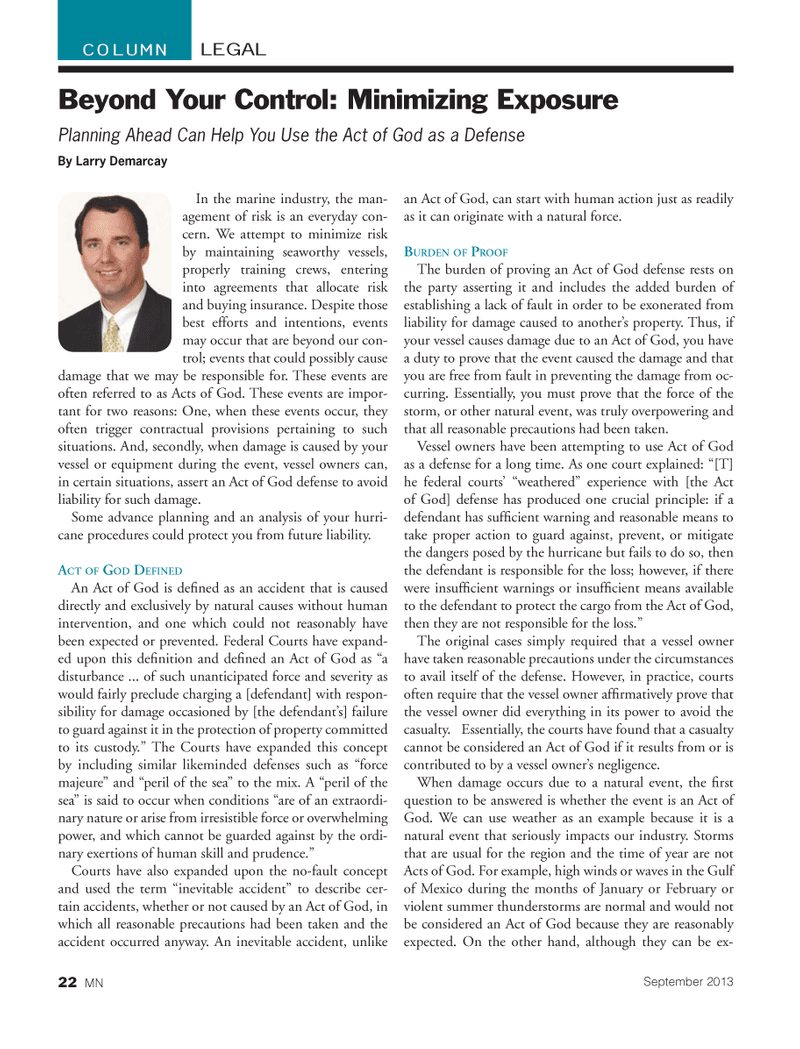
Page 22: of Marine News Magazine (September 2013)
Workboat Annual
Read this page in Pdf, Flash or Html5 edition of September 2013 Marine News Magazine
In the marine industry, the man- agement of risk is an everyday con- cern. We attempt to minimize risk by maintaining seaworthy vessels, properly training crews, entering into agreements that allocate risk and buying insurance. Despite those best efforts and intentions, events may occur that are beyond our con- trol; events that could possibly cause damage that we may be responsible for. These events are often referred to as Acts of God. These events are impor- tant for two reasons: One, when these events occur, they often trigger contractual provisions pertaining to such situations. And, secondly, when damage is caused by your vessel or equipment during the event, vessel owners can, in certain situations, assert an Act of God defense to avoid liability for such damage.Some advance planning and an analysis of your hurri- cane procedures could protect you from future liability. ACT OF GOD DEFINEDAn Act of God is de? ned as an accident that is caused directly and exclusively by natural causes without human intervention, and one which could not reasonably have been expected or prevented. Federal Courts have expand- ed upon this de? nition and de? ned an Act of God as a disturbance ... of such unanticipated force and severity as would fairly preclude charging a [defendant] with respon- sibility for damage occasioned by [the defendants] failure to guard against it in the protection of property committed to its custody.? The Courts have expanded this concept by including similar likeminded defenses such as force majeure? and peril of the sea? to the mix. A peril of the sea? is said to occur when conditions are of an extraordi- nary nature or arise from irresistible force or overwhelming power, and which cannot be guarded against by the ordi- nary exertions of human skill and prudence.? Courts have also expanded upon the no-fault concept and used the term inevitable accident? to describe cer- tain accidents, whether or not caused by an Act of God, in which all reasonable precautions had been taken and the accident occurred anyway. An inevitable accident, unlike an Act of God, can start with human action just as readily as it can originate with a natural force. BURDEN OF PROOF The burden of proving an Act of God defense rests on the party asserting it and includes the added burden of establishing a lack of fault in order to be exonerated from liability for damage caused to anothers property. Thus, if your vessel causes damage due to an Act of God, you have a duty to prove that the event caused the damage and that you are free from fault in preventing the damage from oc- curring. Essentially, you must prove that the force of the storm, or other natural event, was truly overpowering and that all reasonable precautions had been taken. Vessel owners have been attempting to use Act of God as a defense for a long time. As one court explained: [T] he federal courts weathered? experience with [the Act of God] defense has produced one crucial principle: if a defendant has suf? cient warning and reasonable means to take proper action to guard against, prevent, or mitigate the dangers posed by the hurricane but fails to do so, then the defendant is responsible for the loss; however, if there were insuf? cient warnings or insuf? cient means available to the defendant to protect the cargo from the Act of God, then they are not responsible for the loss.? The original cases simply required that a vessel owner have taken reasonable precautions under the circumstances to avail itself of the defense. However, in practice, courts often require that the vessel owner af? rmatively prove that the vessel owner did everything in its power to avoid the casualty. Essentially, the courts have found that a casualty cannot be considered an Act of God if it results from or is contributed to by a vessel owners negligence. When damage occurs due to a natural event, the ? rst question to be answered is whether the event is an Act of God. We can use weather as an example because it is a natural event that seriously impacts our industry. Storms that are usual for the region and the time of year are not Acts of God. For example, high winds or waves in the Gulf of Mexico during the months of January or February or violent summer thunderstorms are normal and would not be considered an Act of God because they are reasonably expected. On the other hand, although they can be ex- LEGALCOLUMNBeyond Your Control: Minimizing Exposure Planning Ahead Can Help You Use the Act of God as a Defense By Larry Demarcay 22 MNSeptember 2013MN Sept2013 Layout 18-31.indd 228/29/2013 11:12:55 AM

 21
21

 23
23
